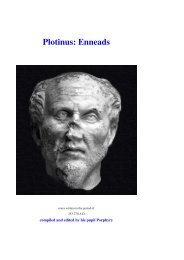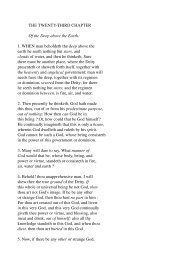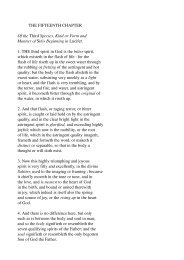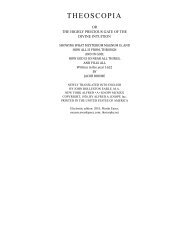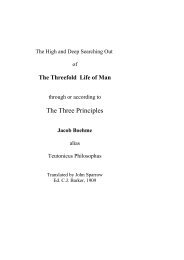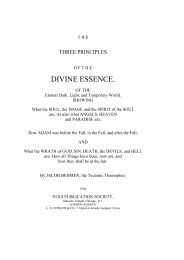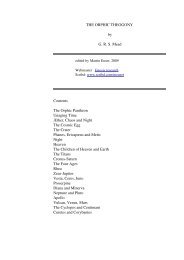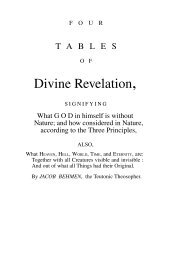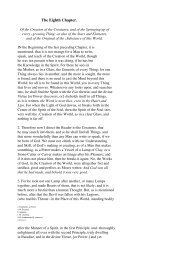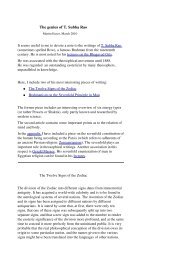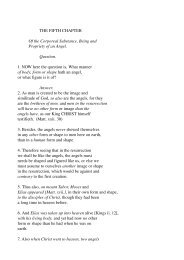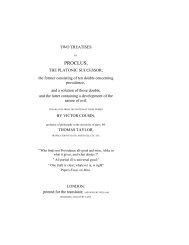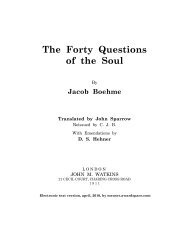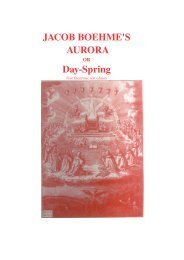Gerald Massey's Lectures - Society in evolution - Awardspace
Gerald Massey's Lectures - Society in evolution - Awardspace
Gerald Massey's Lectures - Society in evolution - Awardspace
You also want an ePaper? Increase the reach of your titles
YUMPU automatically turns print PDFs into web optimized ePapers that Google loves.
Book of Creation, named the Sepher-Jatzirah, is the Book of Creation as the<br />
workmanship of the Former or Potter. Anyone who knows anyth<strong>in</strong>g of the monuments<br />
will here recognize another Egyptian mark; I may say the Egyptian potter's mark on the<br />
Hebrew creations. The Creator or Former, as Khepr-Ptah the Potter, is the head of the<br />
Seven Knemmu, who are his assistants <strong>in</strong> the work of creation. He is the chief of the Ali<br />
or Elohim, as the fashioner and builder of the heavens. He is also the father of the<br />
Egyptian Adam, or Atum, the Red One; just as the Hebrew or Phoenician Elohim are the<br />
creators of Adam the Red. Jehovah-Elohim, the Lord God of the second chapter of<br />
Genesis, can be further identified with Ptah, the founder of the earth and former of men.<br />
Ptah is the father of Atum = Adam, the father of human be<strong>in</strong>gs. He is designated the<br />
father of the fathers, an equivalent to the title of Ialdabaoth, chief of the seven Gnostic<br />
Elohim. The name of Ptah signifies the Opener from Put to open; and the Hebrew name<br />
of xyxtp shows that Jah is Puthach = Putha, or Ptah, as the Opener (cf. Fuerst, p. 1166).<br />
These we may claim for other Egyptian marks.<br />
But I have now learned that the account of the creations <strong>in</strong> Genesis is not so directly<br />
derived from the Egyptian as I had once thought; that is, it was re-written after the time of<br />
the captivity <strong>in</strong> Babylon, and the consequent acqua<strong>in</strong>tance with the creation-legends <strong>in</strong><br />
their latest Persian form. This can be shown by a comparison with the Parsee Bundahish<br />
or Aborig<strong>in</strong>al Creation--more literally, the Creation of the Beg<strong>in</strong>n<strong>in</strong>g. Indeed, we may<br />
suspect that the first words of the Hebrew Genesis have to do with the title of the<br />
Bundahish. They are, "B'Rashith Elohim Bara;" and "B'Rashith," when literally<br />
translated, reads, "<strong>in</strong> the beg<strong>in</strong>n<strong>in</strong>g of," leav<strong>in</strong>g an elipsis, without stat<strong>in</strong>g <strong>in</strong> the<br />
beg<strong>in</strong>n<strong>in</strong>g of what! Now the mean<strong>in</strong>g of the word Bundahish is, the Creation of the<br />
Beg<strong>in</strong>n<strong>in</strong>g. This far more perfect statement seems to have been bungled <strong>in</strong> adapt<strong>in</strong>g it for<br />
the Hebrew version.<br />
The first two facts dist<strong>in</strong>guishable <strong>in</strong> external phenomena by man were those of Darkness<br />
and Light. The panorama of mythological representation is drawn out from these as its<br />
open<strong>in</strong>g scene, and the long procession of the Powers of Nature, which became div<strong>in</strong>ities<br />
at a later stage, starts upon its march through heaven above to cast its shadows on the<br />
earth below.<br />
By observ<strong>in</strong>g the alternation of Light and Darkness, a primary measure of time was first<br />
established as the creation of a night and day, marked by the Tw<strong>in</strong>-Star. And "there was<br />
even<strong>in</strong>g, and there was morn<strong>in</strong>g, one day," as the result of this earliest creation of the<br />
Beg<strong>in</strong>n<strong>in</strong>g. In the Persian Bundahish, the deity Ahura-Mazda is the chief of the Seven<br />
Amchaspands just as the creator Ptah is of the Seven Khnemmu; and the Gnostic<br />
Ialdabaoth of the Seven Elohim. Here we learn that the God created the world <strong>in</strong> six<br />
periods, although not <strong>in</strong> six days. The first of Ahura-Mazda's creatures of the world was<br />
the sky, and his good thought by good procedure produced the light of the world. This is<br />
identical with the Elohim see<strong>in</strong>g the light that it was good; and with the bless<strong>in</strong>g<br />
pronounced on his creations by the Egyptian deity. The light now separated and<br />
dist<strong>in</strong>guished from darkness <strong>in</strong> the creation of time is quite dist<strong>in</strong>ct from the div<strong>in</strong>e, the<br />
abstract, or the illimitable and eternal light already exist<strong>in</strong>g with Ahura-Mazda; it is the<br />
even<strong>in</strong>g and morn<strong>in</strong>g, one day.<br />
Darkness and light are personified and represented as be<strong>in</strong>g at ceaseless enmity with each<br />
other <strong>in</strong> the confusion of Chaos, but they come to an understand<strong>in</strong>g as co-creators, and<br />
make a covenant, <strong>in</strong> appo<strong>in</strong>t<strong>in</strong>g this primeval period of time.<br />
And such was the first creation <strong>in</strong> the Persian series of six. "And of Ahura's creatures of<br />
the world," it is said, "the first was the sky, the second, water; the third earth; the fourth,<br />
plants; the fifth, animals; the sixth, mank<strong>in</strong>d." The creation of light <strong>in</strong> the Hebrew<br />
Genesis is the creation of the sky <strong>in</strong> the Persian; and the creation of water <strong>in</strong> the Persian<br />
Genesis, becomes the divid<strong>in</strong>g of the waters <strong>in</strong> the Hebrew version. The time of this<br />
creation is called the second day.



